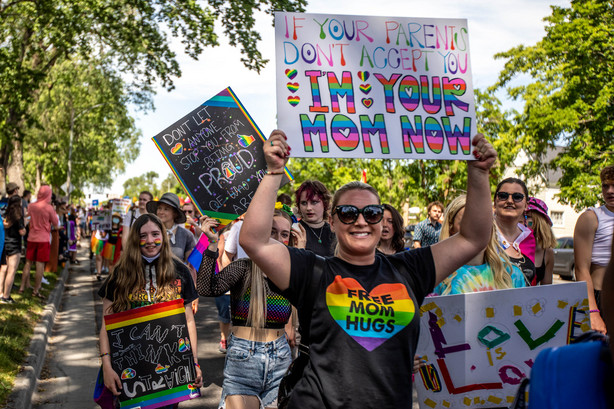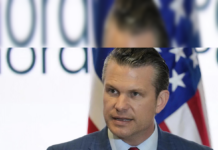SALT LAKE CITY — The state Capitol transformed into a sea of rainbow on Sunday as hundreds gathered to march, celebrate and commemorate Pride Month.
The event — organized by the Utah Pride Center — began with a rally on the steps of the state Capitol before attendees marched through the streets of downtown Salt Lake City.
Dozens of attendees carried a 200-foot pride flag through the streets as they marched underneath rainbow-colored balloon arches set up along State Street. As the march concluded in Liberty Park, the balloon arches were joined together to create one massive arch with over 1,000 balloons.
“We are celebrating the beautiful spectrum of your souls,” Salt Lake City Mayor Erin Mendenhall told the crowd before the march began. She said Pride Month is a time when “we celebrate the diversity and the beauty that makes us who we are.”
Mendenhall also said Salt Lake City would not have its identity as a leader in the state and the region in progressive communities, love and diversity without its members of the LGBTQ community.
After a year of being apart due to the pandemic, coming together to celebrate was especially important for many attendees.
“I started questioning last year right as COVID hit and so I didn’t really have like anyone hardly to talk to about it,” said attendee Hallie Allan, who wore a yellow and purple flag representing the nonbinary community around their neck. “Last year I didn’t get to do pride like this, so I’m happy that I can do it this year.”
“I just barely moved up here and I’m here with my beautiful partner to show support,” added Aidan Funai, Allan’s partner.
“We love coming out and supporting the community. It’s been so hard lately with everything going on,” said attendee Jerek Clark, referencing COVID-19 and the 2020 election.
“I feel like the political situation is still bad but I have a lot more faith that things can change,” Clark said. “I’ve been in the queer community for a decade and … it’s like home.”
Ann Clark, Jerek Clark’s mother who attended with him, noted that she volunteered at the Utah Pride Center for seven years and often brought her child with her.
“It’s where all our friends are,” she said.

“What brought me out here is inclusion,” said Love Richardson, an attendee and indigenous tribal leader for the Nipmuc Nation. “I also came here because I wanted to be happy, and I knew I would be by coming here.”
Richardson came as an ally for Native American people who identify as “Two-spirit,” which is an umbrella term for an ancient identity of indigenous people who identify as having both masculine and feminine spirits.

Richardson wore a traditional skirt with the symbol of her tribe on its front and colorful stitching of two dancing figures, which she said represent Richardson and her bisexual daughter.
“As an indigenous person, the Two-spirit have always had a place in our indigenous society. They were special, they were powerful, the two-spirited,” said Maurice “Mo” Smith, executive director of the Urban Indian Center of Salt Lake and a speaker at the event.
Current Utah politics also became a flashpoint as various speakers discussed recent changes regarding transgender policies.
Mendenhall referenced the announcement earlier this week that transgender sex reassignment surgery and health care coverage will be extended to all city employees, calling it “a proud moment.”
Taking aim at recent state legislation to ban transgender girls from sports, state Sen. Derek Kitchen, D-Salt Lake City and who is openly gay, said in his speech: “We belong at work, in church, at the grocery store, and yes, even in sports.”
The first iteration of the bill was approved by the Utah Legislature in early 2021 but was not supported by Gov. Spencer Cox, who argued the legislation needed to address the concerns of the LGBTQ community and the mental health of transgender students.
“Aug. 17, 2016, I was denied my request for a gender marker change — and a short few months later, so was my dear friend, Angie Rice,” Sean Childers-Gray, president of Ogden Pride, said in his speech. “On May 6, 2021, just 30 days ago, the answer came that all of us, all of Utah — we won!”
Childers-Gray and Angie Rice took their cases to the Utah Supreme Court, where they succeeded in their petition to allow transgender Utahns to amend their birth certificates, driver’s licenses and other state records to reflect the gender with which they identify.
Many attendees carried blue, pink and white striped flags to show support for the transgender community, while others painted the colors onto their bodies.
Speakers also reflected on the past, present and future of the LGBTQ community.

Smith began the rally with a statement acknowledging Utah as the ancestral home of eight indigenous nations.
“Now we need to recognize … that the government, the academia and the institutions we are founded upon continue to enact exclusions and erase indigenous people’s traditional homelands, as well as equal rights of the LGBTQ community,” Smith said.
Childers-Gray reflected on the Stonewall riots of 1969 — a standoff between police and gay rights activists outside of a gay bar in New York City which is considered the birth of the international gay rights movement.
“Though our community continues to be attacked, trans women and trans women of color were always throwing the bricks of revolution,” Childers-Gray said.

“We stand on broad, powerful shoulders of queer people that came before us and did the hard work,” Kitchen added. “Let’s not forget that that’s why we’re here today.”
Activists from Northern Utah Black Lives Matter and the Asian American and Pacific Islander community also discussed the importance of pride in relation to Juneteenth — when African Americans celebrate freedom from slavery — and amid the recent uptick in hate crimes against Asian Americans.
“We won’t stop marching until justice, equality and belonging are afforded to every one of us!” Kitchen said.
Mendenhall concluded: “Hate has no place in the city, it has no place in this community, it has no place in this state.”








